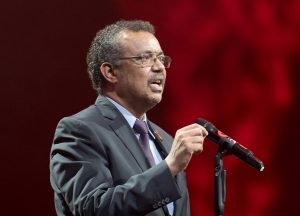Taiwan President Tsai Ing-wen pushed back on Thursday against accusations from the head of the World Health Organization (WHO) that racist online attacks against him had originated in Taiwan, saying the country rejects discrimination and understands the feeling of being excluded due to its inability to participate in the WHO and other international organizations.
WHO Director-General Tedros Adhanom Ghebreyesus accused Taiwan on Wednesday of being the source of racist attacks and death threats. Tedros claimed, without providing evidence, that Taiwan’s foreign ministry was aware of and possibly participated in the attacks.
The foreign ministry called the accusation “groundless” on Thursday and, in a statement, said the 23 million people of Taiwan have been “severely discriminated against” due to their exclusion from the international health system during the global coronavirus pandemic.
In statements posted in English on Facebook and Twitter, Tsai invited Tedros to visit the country, which has received global praise for its response to COVID-19 despite being excluded from the WHO.
“I want to take this opportunity to invite Director-General Tedros to visit Taiwan and experience for himself how committed the Taiwanese people are to engaging with and contributing to the world, even in the face of discrimination and isolation,” Tsai said.
The accusation from Tedros took many in Taiwan by surprise. The WHO head has faced heavy criticism in Taiwan, especially after Taiwanese officials revealed they had informed the WHO in December of possible human-to-human transmission of the coronavirus. Taiwan says that warning was ignored.
Tedros has received ridicule among Taiwanese citizens upset at their exclusion from the global health response to the COVID-19 pandemic, including calls for him to resign and accusations that he is beholden to Chinese leadership, but this commentary is usually not racially charged.
No evidence has been shown that Taiwan’s foreign ministry has ever encouraged, let alone participated in, racist attacks targeting Tedros, who is Ethiopian.
WHO senior adviser Bruce Aylward also became the subject of online ridicule when, in a March 30 interview with Radio Television Hong Kong’s Yvonne Tong, he was asked if the WHO would reconsider Taiwan’s membership. Aylward went silent for several seconds and claimed he couldn’t hear the question; when Tong offered to repeat the question, he appeared to hang up the call.
In recent weeks, Foreign Minister Joseph Wu and other officials have promoted Taiwan’s ability to help the world respond to the coronavirus. Last week, Taiwan said it would export 10 million face masks to the United States and European countries. On Thursday, Taiwan announced it would send an additional 6 million masks to countries in Asia, Europe, and the Americas.
Taiwan’s mask donations were criticized by China’s foreign ministry, which accused it of playing “political tricks” to join the WHO and said Taiwan had prohibited mask exports to China at the height of its own outbreak. This export ban, in January, came at a time when Taiwan had a mask shortage; it has since raised mask production to over 13 million per day and began loosening export restrictions in late March.
Taiwanese attempts to participate in the global community risk backlash from Beijing, no matter how anodyne they may be, due to the Chinese government’s view of Tsai as an advocate for Taiwan independence. Less than 9 percent of Taiwanese people favor unification with China, either now or in the future, according to a December 2019 poll by National Chengchi University’s Election Study Center.
The accusations from Tedros came as part of a response to a request for comment on U.S. President Donald Trump’s Tuesday remark that the United States could cut funding to the WHO. Tedros called on the U.S. and China to jointly fight the COVID-19 pandemic before accusing Taiwan of being behind the racist attacks.
The foreign ministry said it could not have controlled these attacks, which could have come from internet users of any identity or nationality, and called on Tedros to apologize and issue a correction.
Within Taiwan, the accusations sparked discussion of ongoing issues the country does have with discrimination, especially toward Southeast Asian foreign workers and people of color. Many online commenters called for these problems to be addressed simultaneously with Taiwan’s rejection of the allegations made by Tedros.
Twitter users on Thursday utilized a new hashtag – #ThisAttackComeFromTaiwan – to welcome visitors to Taiwan once the pandemic subsides with photos of bubble tea, natural landscapes, and Tsai’s cats.
































